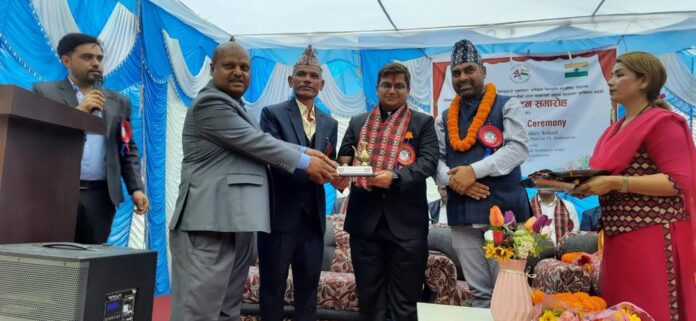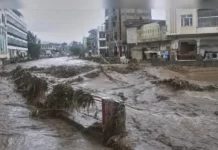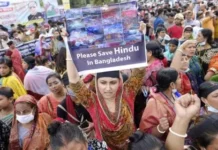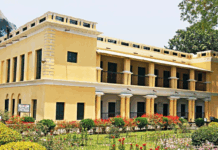KATHMANDU: Deputy Chief of Mission at the Indian Embassy in Kathmandu, Prasanna Shrivastava, on Wednesday handed over the building of Mahendra Rashtriya Secondary School here to the local authorities.
The school building was built with Indian assistance.
Santosh Budhathoki, chairman of the District Coordination Committee, said addressing the handover event at Baluwatar, Kathmandu, “The generous support of the Government of India has been very useful for us in building many such institutions. The Mahendra Rastriya Secondary School is one of many instances of our bilateral cooperation. We hope to boost such collaborative efforts in the time to come.”
According to the Indian Embassy in Kathmandu, the building of Shree Mahendra Rastriya Secondary School, Baluwatar, Kathmandu was built with Indian assistance worth NRs.19.20 million, under the ‘Nepal-India Development Cooperation.
Built 15 years ago, the building has now been formally handed over. It was inaugurated jointly by Prasanna Shrivastava, Deputy Chief of Mission, Indian Embassy, in Kathmandu, and Santosh Budathoki, chief, DCC Kathmandu.
Political representatives, social workers, officials of the Nepali government, representatives of school management, teachers, parents, and students were also present at the event.
The grant from the Indian government, under ‘Nepal-India Development Cooperation’, was utilised for the construction of the triple-storey school building and the provision of furniture for the school. The project was taken up as a high-impact community development project under an agreement between the two governments.
The project was implemented through the District Coordination Committee, Kathmandu.
“This project is part of a robust development partnership between India and Nepal, which has made significant progress in recent years through the implementation of various projects across key sectors of the Nepalese government and for the people,” Srivastava said.
Mahendra Rastriya Secondary School was founded as a primary school in 1956 through the efforts of a group of motivated teachers. The school was recognised by the Nepal government in 1973 as a primary school and was upgraded to Lower Secondary in 1995. It was later upgraded to Secondary level in 2000 before being bestowed the status of a Higher Secondary School.
The school has a strength of over 600 students, 50 per cent of whom are girls. Since its inception, the school has achieved remarkable success, imparting quality education to children from the local community.
Since 2003, India has taken up over 546 High Impact Community Development Projects in Nepal in various sectors and has completed 483 projects. Amongst these, 105 projects are in Bagmati Province in various sectors. These include 40 projects in Kathmandu.
In addition to these, the Indian government gifted 974 ambulances and 234 school buses to various hospitals, health posts and educational institutions in Nepal on the country’s Independence Day and Republic Day.
Of these, 69 ambulances and 52 school buses were provided in Kathmandu, till date.
As close neighbours, India and Nepal share wide-ranging, multi-sectoral cooperation.
The implementation of HICDP projects reflects the continued support of the Indian government in bolstering the efforts of the Nepalese government in the upliftment of its people, augmenting infrastructure in priority sectors, especially the education sector in Nepal. (ANI)
Also Read: India, Nepal relations on downward spiral







